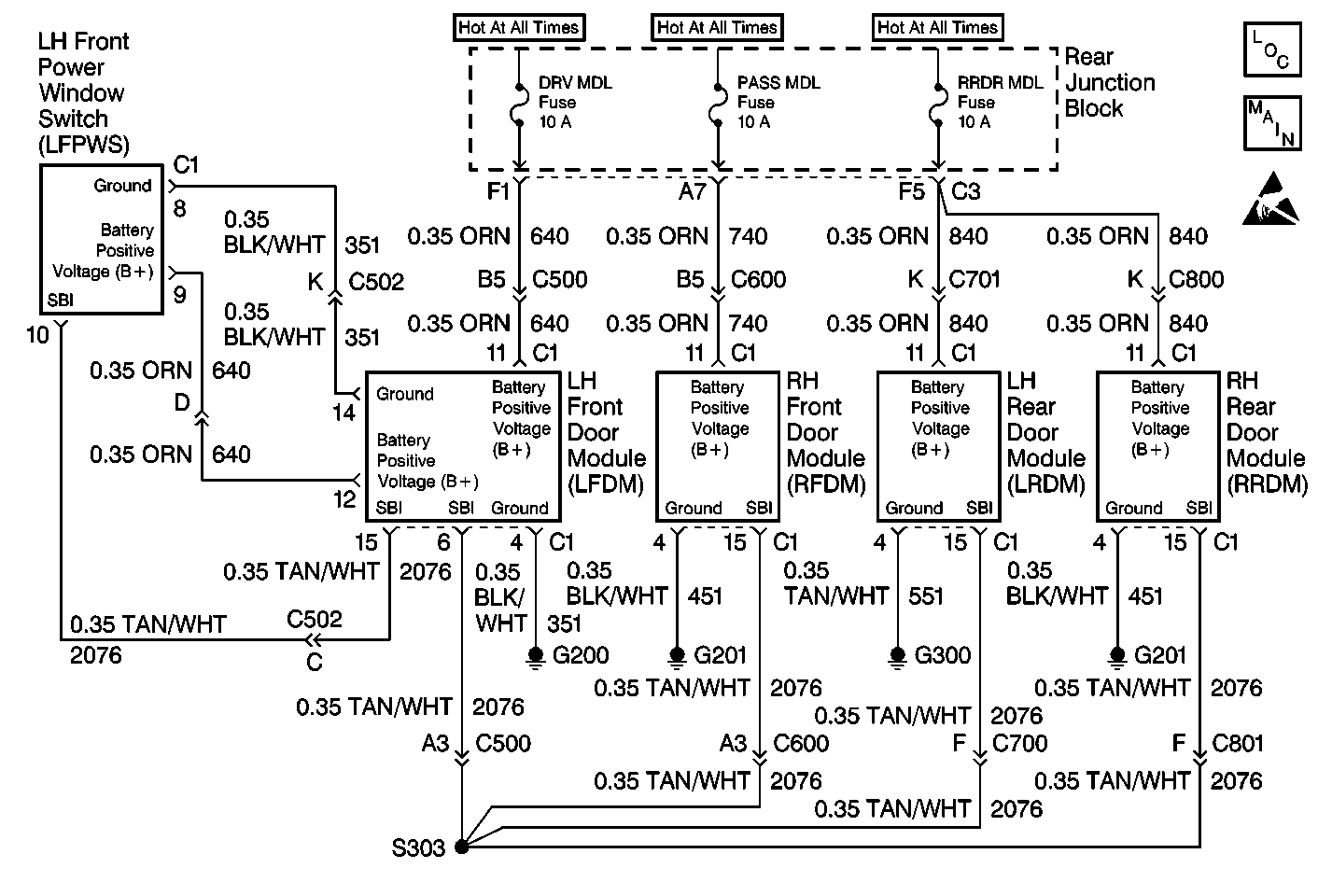
Circuit Description
The SBI data line is used to communicate information between the door modules. Each module connected to the SBI is assigned its own recognition code (address). This code is used to identify which modules are communicating. Modules communicate with each other by periodically sending State of Health (SOH) messages. When the ignition switch is in RUN, each module communicating on the SBI sends a State of Health (SOH) message every two seconds to ensure that the system is operating properly. When the LFPWS Assembly stops communicating on the SBI, for example if the LFPWS Assembly loses power or ground, the SOH message it normally sends disappears. The LFDM, which expects to receive the SOH message, detects its absence and sets DTC U1170 current.
Conditions for Setting the DTC
| • | The LFDM does not receive a State of Health (SOH) message back from the LFPWS Assembly. |
| • | This DTC only sets if DTC B1982, B1983, U1300 or U1301 is not current in module memory. |
Action Taken When the DTC Sets
| • | DTC U1170 is stored in module memory. |
| • | The LFDM uses the default values for the initialization data. |
| • | This DTC does not cause a driver warning message to appear. |
Conditions for Clearing the DTC
| • | This DTC clears (status changes from current to history) under any of the following conditions: |
| - | The LFDM detects a State of Health Message from the LFPWS Assembly. |
| - | On each ignition cycle. |
| • | A history DTC clears after 50 consecutive ignition cycles if the conditions for setting the DTC are no longer present. |
| • | Current and history DTCs may be cleared using a scan tool or using the On-Board System Diagnostic feature. |
Diagnostic Aids
| • | DTC module U1170 does not normally represent a failure within the module. |
| • | If the DTC is a history DTC, the problem may be intermittent. |
| • | A grounded CKT 2076 will set following DTCs U1161, U1162, U1163, and U1170. |
Test Description
The numbers below refer to the step numbers on the diagnostic table:
-
This step inspects for other related DTCs that are set.
-
This step tests for battery voltage on CKT 640 at the LFPWS.
-
This step tests for ground on CKT 351 at the LFPWS.
-
This step tests for voltage on the simple bus interface CKT 2076 at the LFPWS.
-
This step tests for an open or high resistance on CKT 2076 at the LFPWS.
Step | Action | Value(s) | Yes | No |
|---|---|---|---|---|
1 | Was the Power Door Diagnostic System Check performed? | -- | Go to Step 2 | |
Are DTCs U1161 and U1162 and U1163 also set? | -- | Go to Step 3 | ||
Does the voltage measure within the specified range? | 10-15 V | Go to Step 5 | Go to Step 4 | |
4 | Repair the open or the short to ground in CKT 640. Refer to Wiring Repairs . Did you complete the repair? | -- | -- | |
Using a DMM, measure resistance between terminal 8 and ground. Does the resistance measure within the specified range? | 0-5 ohms | Go to 7 | Go to Step 6 | |
6 | Repair the open or the high resistance in CKT 351. Refer to Wiring Repairs . Did you complete the repair? | -- | -- | |
Using a DMM, measure the voltage between terminals 10 and 8 at the LFPWS. Does the voltage measure within the specified range? | 10-15 V | Go to 11 | Go to 8 | |
8 | Using a DMM, measure the resistance between the LH front door module harness connector C1 terminal 15 and the LFPWS terminal 10. Does the resistance measure within the specified range? | 0-5 ohms | Go to 10 | Go to 9 |
9 | Repair the open or the high resistance in CKT 2076. Refer to Wiring Repairs . Did you complete the repair? | -- | -- | |
10 | Replace the LFDM. Refer to Door Control Module Replacement . Did you complete the replacement? | -- | -- | |
11 | Replace the LFPWS. Refer to Front Door Switch Replacement . | -- | - |
